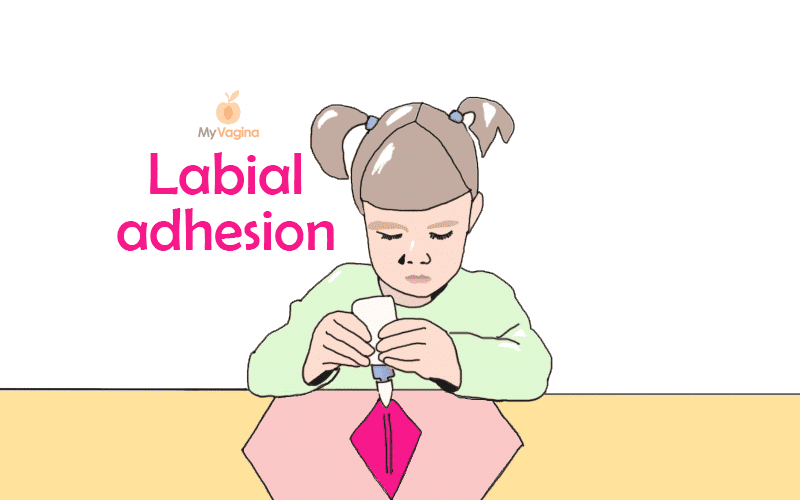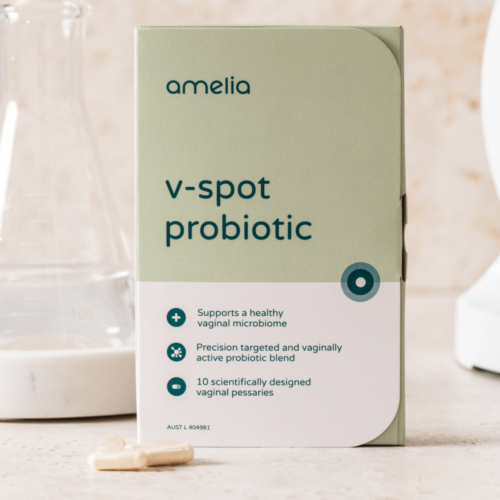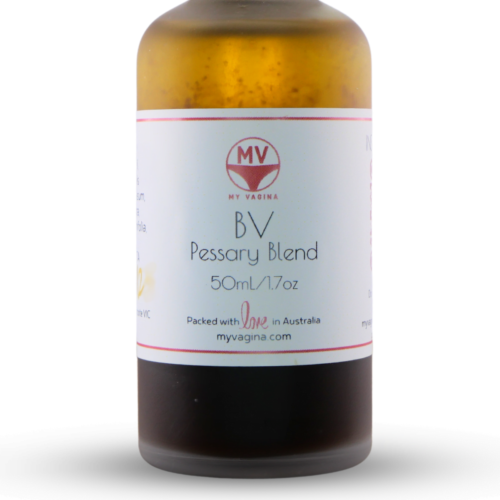Labial adhesion, also called labial agglutination, is a condition whereby the labia majora (outer labia) fuse together. Labial agglutination is a reasonably common occurrence in girls prior to puberty.
There are usually no other symptoms and treatment is minimal, however it is important to ensure other disorders are not present when faced with labial fusing.
Other conditions that may need to be investigated include an imperforate hymen (a hymen that completely closes off the vaginal entrance) or a septate vagina (the vaginal septum, creating a ‘double vagina’).
The ages labial adhesions most commonly occur are between three months and three years, but the labial fusing can linger on until puberty.
Signs and symptoms of labial adhesion
- Urine may fill up the vagina because it’s trapped, and leak out over a period of time after urinating (called postvoid dribbling or vaginal voiding)
- A secondary urinary tract infection may occur
- Uncomfortable urination
- A thin, pale, somewhat translucent membrane may cover the vaginal opening inside the labia minora, and may sometimes completely close over the vaginal opening, starting from the bottom of the vaginal opening and working its way up towards the clitoris
- Some masses may grow on the labia or other genital abnormalities might be present
- Signs of sexual abuse may be present
Diagnosing labial adhesion
Labial adhesions are most often found by parents or during an examination, and are more often found if there is inflammation of the vulva (vulvovaginitis). When a doctor diagnosis labial adhesion, there are a few things they must rule out, including:
- Hymen skin tags
- Imperforate hymen (where the hymen completely blocks the vaginal entrance)
- Introital cysts (paraurethral or Gartner duct cysts)
- Ureterocele (a birth defect causing urine flow problems)
- Urethral polyp
- Urethral prolapse
- Vaginal atresia or Müllerian agenesis (MRKH syndrome)
- Vaginal rhabdomyosarcoma
If a girl has urinary symptoms, urine culture may be requested to check for infection or inflammation.
Resolution and treatments for labial adhesion
The resolution of labial adhesions most often occurs during puberty when hormones shift, but can occur in a short time after the condition develops, for example a year later.
Usual treatment is to leave labial adhesions alone, then to use oestrogen cream, then to try surgery. Steroid creams are also sometimes prescribed.
Oestrogen cream (Premarin) for labial adhesion
Premarin or other oestrogen cream is applied 2-3 times per day for a few weeks, until the labia start to come apart, where frequency is reduced, and emollient cream is begun.
Studies show this treatment has a very good success rate of over 90 per cent. All minor side effects of local hormones disappear after treatment ends.
Surgery for labial adhesion
The surgery for labial fusion is uncomplicated and does not require stitches. The labia come apart quite easily, however it can be painful for the child, so local anaesthetic is recommended.
Sometimes a general anaesthetic will be warranted if the child is likely to become very distressed. Children most often do best in the operating room for this procedure, however how this is approached will be decided on an individual basis.
Treatment notes for labial adhesion
- Topical oestrogen cream may be prescribed, particularly if frequent UTIs are occurring
- Manual or surgical separation may need to be considered if urinary problems are being encountered and unresolved, or if the adhesion is very fibrous
- Avoid exposure to irritants like soaps, detergents, bubble baths, and laundry detergent (choose hypoallergenic)
- Regularly visit with a doctor, paediatric urologist or gynaecologist to keep an eye on the issues
- If oestrogen or surgery are used, emollient cream must be applied several times a day to keep the labai from reattaching
Note: Oestrogen cream may cause a temporary pigmentation change on the area applied, however this normally fades after treatment stops. Your child’s breasts may become tender or enlarge.
Why does the labia fuse?
Labial adhesions are fibrous and occur between the labia majora, not the labia minora, which sit between the outer labia. Their occurrence in childhood is the period where girls don’t have any oestrogen, also making this rare in newborns (who still keep oestrogen from their mothers).
Oestrogen levels, however, have been tested and there was no significant difference in oestradiol levels in girls with labial adhesions and those without.
These adhesions can also be triggered by inflammation, irritation, or vaginal or vulvar trauma. Sexual abuse can result in labial adhesions due to trauma to the tissues.
How natural medicine approaches labial agglutination
Natural medicine practitioners and doctors take the same general approach to labial adhesions: it is not dangerous and unless it is causing discomfort during urination, should be left alone.
A natural medicine practitioner is likely to look at the rest of the child’s development and health to see if there are any clues to point to another reason for labial agglutination, such as skin and food sensitivities, intolerances, and allergies.
These other problems can then be dealt with. There may be changes in the labial agglutination, or there may not.
Each child is different in this respect. If separation is required, plant oestrogens work in the same way as regular human oestrogens, but are 300 times weaker. This may mean that incorporating more phyto-oestrogens into a young girl’s diet or topical applications can help to naturally separate the labia, at least enough to allow normal urination.
It’s important to get professional help when using plant oestrogens as a treatment strategy, particularly by mouth.
Use of plant oestrogens would only be as temporary as using oestrogen cream, and only used in place of oestrogen cream as necessary. The effect is essentially weaker, but the same idea, and it is for this reason that at the end of the day it doesn’t really matter where you get the oestrogens from.
If the labia need to be separated for urination, it may be more useful to use the regular oestrogen cream, as it will work faster than a weaker plant oestrogen.
Specially formulated probiotic for vaginal application to promote a healthy vaginal microbiome.
Unique, comprehensive BV, AV and 'mystery bad vag' treatment guide, one-of-a-kind system, with effective, innovative treatments.






